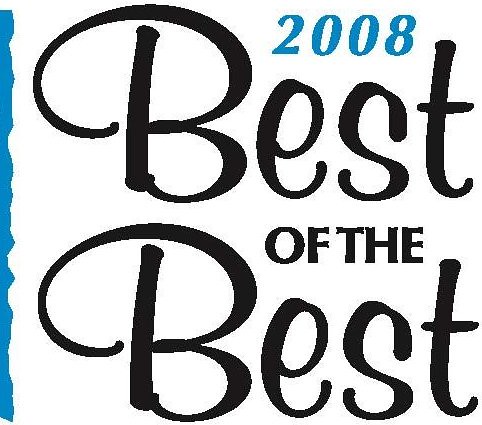If you’re looking for the year’s best, you can shorten your search by heading directly to Word for Word, that ever-amazing group that turns short works of fiction into some of the most captivating theater we see around here. This year, we were graced with two outstanding Word for Word productions.
You Know When the Men Are Gone – Word for Word’s first show of the year was based on two excellent stories by Siobhan Fallon. We are a country at war, and as such, we can never be reminded too often about the sacrificed made not only by the men and women serving in harm’s way but also the families and friends they leave behind. These connected stories, masterfully directed by Joel Mullenix and Amy Kossow, created a direct, emotional through line into the heart of an experience we need to know more about. Read my review here.
In Friendship – A few months later, Word for Word returned to celebrate its 20th anniversary by casting the nine founding women in several stories by Zona Gale about small-town, Midwestern life. It was pleasure from start to finish, with the added emotional tug of watching the founders of this extraordinary company acting together for the first time. Read my review here.
Campo Santo, Intersection for the Arts and California Shakespeare Theater collaborated this year on an intimate epic about the Golden State we call home comprising three plays, art projects, symposia and all kinds of assorted projects. This kind of collaboration among companies is exactly the kind of thing we need to infuse the art form with new energy and perspectives. The best of the three theatrical offerings was the first.
The River – Playwright Richard Montoya authored the first two plays in this collaboration, and though the Cal Shakes-produced American Night was wild and enjoyable, Montoya’s The River, directed by Sean San José had the irresistible pull of a fast-moving current. A truly original work, the play was part comedy, part romance, part spiritual exploration. Read my review here.
Ideation – My favorite new play of the year is from local scribe Aaron Loeb because it was fresh, funny and a thriller that actually has some thrills. Part of San Francisco Playhouse’s Sandbox Series for new play development, Ideation is still in search of the perfect ending, but you can expect to hear much more about this taut drama of corporate intrigue and interpersonal nightmares. Read my review here.
The Pianist of Willesden Lane – The combination of heartbreaking personal history and heart-expanding piano music made this Berkeley Repertory Theatre presentation the year’s best solo show. Mona Golabek tells the story of her mother’s exit from Germany as part of the Kindertransport includes all the horror and sadness you’d expect from a Holocaust story, but her telling of it is underscored by her exquisite piano playing. Read my review here.
Other Desert Cities – TheatreWorks demonstrated the eternal appeal of a well-told family drama with this Jon Robin Baitz play about Palm Springs Republicans, their lefty-liberal children and the secrets they all keep. This one also happens to have the most beautiful set of the year as well (by Alexander Dodge). Read my review here.
The Fourth Messenger – Tanya Shaffer and Vienna Tang created a beguiling new musical (no easy feat) about Buddha (absolutely no easy feat). The show’s world premiere wasn’t perfect, but it was damn good. Expect big things from this show as it continues to grow into its greatness. Read my review here.
Good People – Any play starring Amy Resnick has a good chance of ending up on my year’s best list, but Resnick was beyond great in this David Lindsay Abaire drama at Marin Theatre Company. Her Margie was the complex center of this shifting, surprising story of old friends whose lives went in very different directions, only to reconnect at a key moment. Read my review here.
The Taming – One of the year’s smartest, slyest, most enjoyable evenings came from Crowded Fire Theatre and busy, busy local playwright Lauren Gunderson. This spin (inspired by The Taming of the Shrew) was madcap with a sharp, satiric edge and featured delicious comic performances by Kathryn Zdan, Marilee Talkington and Marilet Martinez. Read my review here.
Terminus – Oh so dark and oh so very strange, Mark O’Rowe’s return to the Magic Theatre found him exploring theatrical storytelling that encompassed everyday lie, mythic monsters and rhymed dialogue. Director Jon Tracy and his remarkable trio of actors (Stacy Ross, Marissa Keltie and Carl Lumbly) grabbed our attention and didn’t let it go for nearly two hours. Read my review here.
No Man’s Land – Seems a little unfair to include this production here if only because the can’t-miss team of Sir Ian McKellen and Sir Patrick Stewart would likely be a year’s best no matter where they were performing or what they were doing. In this case, they were headed to Broadway but stopped at Berkeley Rep to work on Harold Pinter’s enigmatic comic drama. Their work (along with that of Billy Crudup and Shuler Hensley) provided laughs and insight and complexity where you didn’t know any was possible. Pure master class from start to finish. Read my review here.
Breakout star of the year: Megan Trout. It was impossible not to be transfixed by Megan Trout not once but twice this year. She illuminated the stage as Bonnie Parker in the Mark Jackson-directed Bonnie and Clyde at Shotgun Players and then stole the show in the Aurora Theatre Company’s A Bright New Boise as a shy big-box store employee who is mightily intrigued by the new guy who also happens to have been involved with a now-defunct cult. Trout has that magnetic ability to compel attention and then deliver something utterly real and constantly surprising.


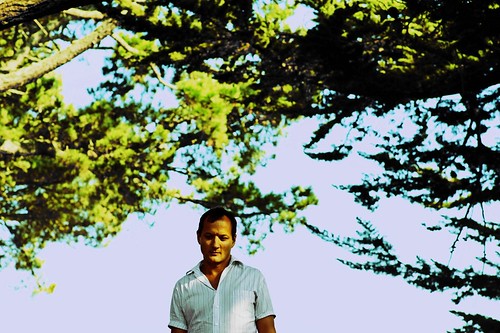


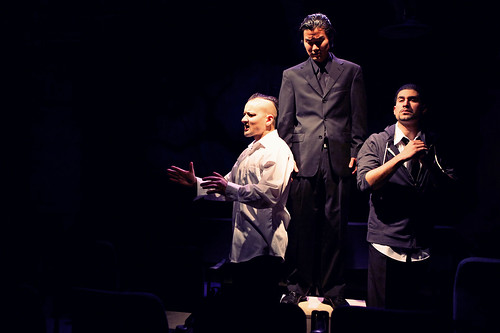
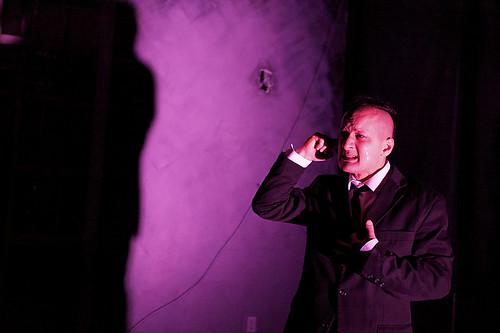



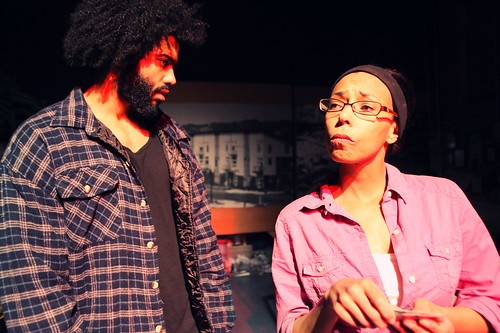




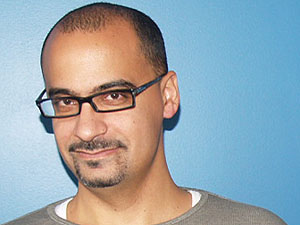
 Fuku Americanus.
Fuku Americanus.